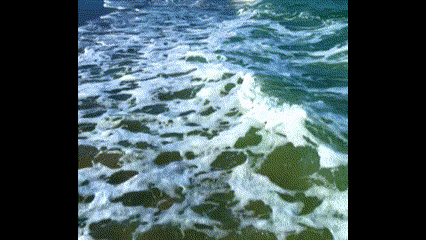The Truth Lies in The Waves
The truth lies in the waves.
I watched the ocean waves at night, waiting for at least one to resemble the previous one, but none did. There are no two identical waves. How should I understand this?
Deleuze distinguishes between fatigue and exhaustion. Fatigue is physical, but exhaustion implies the limits of culture's possibilities as if everything has already been said and done. However, this exhaustion is productive for him because it is simply the limit of the system's capabilities, not the end of its action. And for me, there is no more explicit example of productive exhaustion than the existence of inexhaustible waves in planetary time.
Forming and moving so many unique waves may be exhausting and challenging. And I experience this exhausting renewal in the waves. It's almost avant-garde but with constant renewal and yet sameness. So, what is the same in the waves?
I can also view the waves from a Dasein perspective and experience an authentic sense of being with each new wave instead of exhaustion. However, I need some time from wave to wave to understand my presence in every moment, during which I might miss some moments of the wave's movement. Dasein needs the grey everydayness to imagine itself. If there were no notion of Das Man, there wouldn't be Dasein either because it is impossible to represent the meaning of something instantaneously.
And this is precisely what Derrida says: every meaning differs from itself and is deferred to another meaning (Difference and deferral - différance). For example, if you say 'cat,' it is impossible to think of only one thing within that word and for it to exist with only one meaning continuously because a cat is also an animal, and when you say 'cat,' the non-existent animal abducts the word 'cat' as its only meaning. Perhaps this doesn’t sound problematic with the word 'cat,' but for the Dasein embodied in language, the deferral of its meaning in the present moment is destructive. Derrida shows us that Dasein is a metaphysical representation of being. In reality, being also includes non-being (here, I can no longer tolerate Hamlet). The waves seem to perfectly justify Derrida's philosophy of fluid meanings. You cannot stop the waves and say, 'This is a wave.' If you show me a photo of a wave, the identity of this object will not be a wave; it will be a photo.
I can also view the waves through Sartre's eyes to think that this movement and noise only happen in my mind. I determine whether to watch them or not. It is my will and freedom that determine whether they exist or not.
However, in this view, the waves resemble more of a set piece, and I wouldn’t say I like that. I want the wave to be determined by its own ability to differ from itself, not by me infinitely. I don’t want to pause and break the sequence of waves somewhere. I want to see where one disappears and the next appears, but that’s impossible. In the meantime, I no longer have the grey space between the waves where I could have asked Heideggerian existential questions about my being. In other words, I am halfway present when I am fully engaged with the waves, which is liberating, which is why people go on vacation in the first place.
And yet, what is a wave if it is never the same? If you asked Plato, the uniqueness of the wave is actually a shadow of this secondary world. What matters in a wave is its idea, its wave-ness. Only with Plato by your side can you ask real philosophical questions. What creates a wave? Environmental factors move it, but don’t waves also have their own engineering, a constantly repeated structure? If I start studying the structure of a wave, the waves will become more predictable and understandable, but in that understanding, I would have to ignore the details that make up the wave and see what doesn’t exist. This might be 'Plato’s Pharmacy,' as Derrida would say. However, both Plato and Derrida agree that meaning is not immediately present in the object. Understanding here almost depends on choice and belief. Do you believe the change is due to shadows on the cave's walls? What should I focus on in the uniqueness of the waves, their uniqueness itself, or should I see the same wave in them?
Why do I need ideal waves without deviation and splashes scattered here and there? I probably wouldn’t be able to vacation in Plato's world of ideas.
Before I delve into Eastern philosophy and Hokusai’s The Great Wave off Kanagawa, I will stop writing and keep thinking about the waves.
